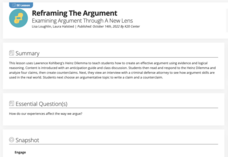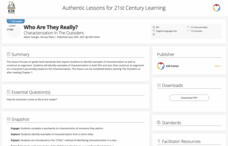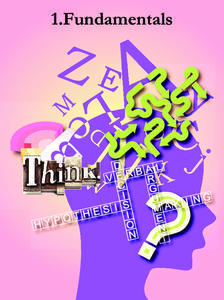K20 LEARN
To Ban or Not to Ban? Intellectual Rights and Responsibilities: Banned Books, Censorship Part 2
After examining different perspectives on book banning, scholars select a book from a list of frequently banned books and research the controversies surrounding it. They then craft an argument about their chosen book, including arguments...
New York State Education Department
TASC Transition Curriculum: Workshop 11
You'll C-E-R a difference in classroom achievement after using a helpful lesson plan. Designed for economics, civics, government, and US history classes, participants practice using the CER model to craft arguments about primary and...
Math Stars
Math Stars: A Problem-Solving Newsletter Grade 6
Think, question, brainstorm, and make your way through a newsletter full of puzzles and word problems. The resource includes 10 different newsletters, all with interesting problems, to give class members an out-of-the box...
Math Stars
Math Stars: a Problem-Solving Newsletter Grade 7
Put on your thinking caps because middle school math has never been more interesting in this huge resource full of thought provoking questions. Written as a newsletter, the resource has 10 two-page newsletters with a variety of...
Curated OER
Lesson: Proposal for a School Sculpture
After discussing the artistic elements and design process needed to construct the modern sculpture, Lao Tzu, kids get logical. They consider the purposeful use of space in the sculpture, design a modern piece for a specific space at...
Texas Education Agency (TEA)
Evaluating the Effectiveness of Arguments, i.e., Identify Fallacies (English III Reading)
A series of interactive exercises provide users with the ammunition they need to detect logical fallacies and defend themselves against persuasion. Learners read about 11 types of logical fallacies and identify the type used in sample...
K20 LEARN
Reframing the Argument: Examining Argument through a New Lens
As part of a study of crafting compelling arguments, class members tackle the problem presented in Lawrence Kohlberg's "The Heinz Dilemma." After discussing the dilemma with classmates, writers draft an essay with a claim, support...
K20 LEARN
Taking a Bite! Exploring Cultural Identity Through Food
High schoolers are asked to consider the connections between food, culture, and identity. They read articles and share what they learned in a jigsaw activity, read a short story, and make a claim about the story's theme, backing up their...
K20 LEARN
Trigger Warnings - Intellectual Rights and Responsibilities: Banned Books, Censorship Part 1
"Warning: Conducting this lesson may be harmful." Such statements, called "Trigger Warnings," are the focus of a two-part lesson that looks at censorship, especially the pros and cons of trigger warnings. Class members read two articles,...
Curated OER
"The Story of an Hour" Lesson 5: Teacher's Guide and Notes
Learning how to craft a compelling argument supported by evidence and logical reasoning is an essential skill. The fifth activity in "The Story of An Hour" unit asks young scholars to formulate an argument in response to the question,...
K20 LEARN
Writing An Argumentative Paragraph: Argumentative Writing
Learning how to craft a cogent argument based on a solid claim, supported with evidence and solid reasoning, is an important life skill. Teach middle schoolers about argumentative writing with a lesson plan asking them to analyze the...
K20 LEARN
Who Are They Really?: Characterization In The Outsiders
Ponyboy, Johnny, Winston, and Darry come alive in a instructional activity that focuses on the details S. E. Hinton uses to characterize the Greasers and the Socials. The class first observes the actors' words; the thoughts revealed...
K20 LEARN
Let Us Start The Lettuce Club (Or Not): Writing A Thesis Statement
Let us be frank! Writers learn that crafting a thesis statement is not that difficult if one peals back the layers. After watching several videos about the elements of a thesis, class members read the article "Lettuce Club helps students...
K20 LEARN
Friends, Romans, Countrymen, Lend Me Your Emotions: Julius Caesar
Scholars, high schoolers, class members! With the help of this instructional activity, you too can identify the three persuasive appeals (ethos, pathos, and logos) the characters in William Shakespeare's tragedy Julius Caesar...
K20 LEARN
Simply Elementary, Watson!
Explore the process of inductive and deductive reasoning. A collaborative lesson has some groups apply an inductive approach and others a deductive approach. Through class discussion, scholars compare their processes and discuss...
Education Bureau of Hong Kong
Fundamentals of Critical Thinking
Analyzing arguments is key to critical thinking. Colorful slides teach viewers how to recognize the structure of an argument, the claims, and the validity of the evidence used to support an argument. Then, provided scenarios permit...
Education Bureau of Hong Kong
Fundamentals
"Fundamentals," the first lesson in a series of eight, introduces the basic concepts and strategies covered in a series of resources designed to teach high schoolers critical thinking skills. The worksheets and activities in this first...
EngageNY
Grade 10 ELA Module 2: Unit 3, Lesson 2
Is good good enough? Scholars examine claims made in a speech by Elanor Roosevelt. Roosevelt claims that people should adopt the Universal Declaration of Human Rights because it is a good document. Readers discuss their ideas in pairs,...
Tutorials Point
Artificial Intelligence
You needn't take a stress pill or don a space helmet to take a tutorial in artificial intelligence. In fact, HAL might recommend the course with great enthusiasm and confidence for those seeking an introduction to AI.
American Statistical Association
Happy Birthday to . . . Two?
How many people do you need in a room before two likely share the same birthday? Scholars consider this puzzle by analyzing a set of data. They ponder how to divide the data and determine the proper size of a group for this event to...
Community High School of Vermont
Habits of the Mind
An informative one-page resource details the 16 Habits of Mind. Habits encourage positive problem-solving, self-awareness, creativity, and dedication—lifelong skills that can be used in both academic and social settings.
Florida Institute of Technology
Who Owns the Zebra?
Five women of different ethnicities and living in differently colored houses own different pets, drink different beverages, and work in different professions. Who is who? Solve a logic puzzle that provides 14 clues about connections...
New York State Education Department
TASC Transition Curriculum: Workshop 5
Are video games sports? Pupils investigate this question as well as various nonfiction selections to learn more about claims and the support that defines them. All of the selections mimic the rigor on state tests and encourage close...
University of North Carolina
Argument
What elements make up a successful argument? A helpful resource describes aspects of an argument such as the claim, evidence, counterargument, and audience. Perfect as an individual assignment for a flipped lesson or collaborative work,...

























